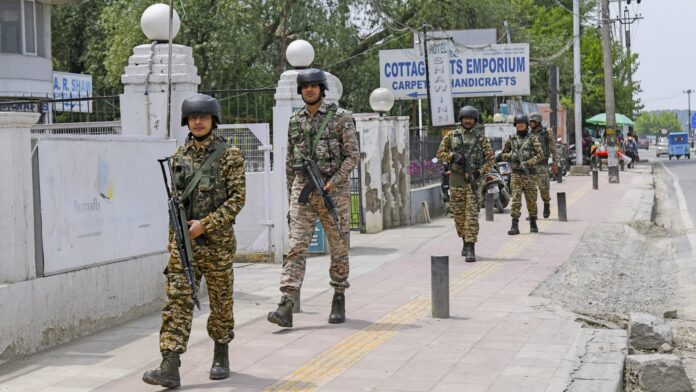Security personnel stand guard near Dal Lake in Srinagar, India, on May 6, 2025.
Basit Zargar | AFP | Getty Images
India early on Wednesday said its armed forces had conducted strikes against Pakistan and what it calls Pakistan-occupied Jammu and Kashmir, targeting “terrorist infrastructure.”
“Our actions have been focused, measured and non-escalatory in nature. No Pakistani military facilities have been targeted,” the country’s Ministry of Defence said.
The operation, which the ministry said was aimed at nine sites “from where terrorist attacks against India have been planned and directed,” follows a militant attack last month in Pahalgam, Jammu and Kashmir, in which 26 people were killed.
“We are living up to the commitment that those responsible for this attack will be held accountable,” the statement said, while adding that India had shown “considerable restraint in selection of targets and method of execution.”
The Defence Ministry said there will be a detailed briefing on the strikes, labeled “Operation Sindoor,” later in the day. Sindoor refers to a red- or orange-colored powder mostly worn by Indian Hindu married women.
Speaking to CNBC, Pakistan’s Information Minister Attaullah Tarar accused India of violating his country’s territorial sovereignty and attacking its civilian population.
“Pakistan has every right to give a robust response to this act of war imposed by India, and a strong response is indeed being given,” Pakistan’s Prime Minister Shehbaz Sharif said earlier, according to AP.
Pakistan’s foreign ministry said the strikes were carried out by the Indian Air Force from within Indian airspace. Tarar claimed five IAF jets were shot down as they were heading toward Pakistani territory.
Three civilians were reportedly killed by Pakistani shelling across the Line of Control — the de facto border that separates Indian and Pakistani-administered parts of Jammu and Kashmir. “We’ve not targeted any civilians,” Tarar said.
Most airlines are diverting out of Pakistani airspace, according to flight tracker FlightRadar24. Indian airlines such as IndiGo and SpiceJet said that airports in northern India and flights were impacted. Middle Eastern airline Qatar Airways has temporarily suspended flights to Pakistan due to the closure of Pakistani airspace.
U.S. President Donald Trump told journalists in the White House that “I guess people knew something was going to happen based on a little bit of the past.” “It’s a shame,” Trump said, adding “I just hope it ends very quickly.”
U.S. Secretary of State Marco Rubio said he was monitoring the situation closely, and would continue engaging both sides’ leadership toward a peaceful situation. India’s National Security Adviser Ajit Doval had briefed Rubio after the strikes, India’s embassy to the U.S. said.
Separately, United Arab Emirates foreign minister Sheikh Abdullah bin Zayed called on India and Pakistan to “exercise restraint, de-escalate tensions, and avoid further escalation that threaten regional and international peace,” according to Emirati state media.
On Monday, United Nations Secretary General Antonio Guterres said in a post on X that India and Pakistan should avoid a military confrontation as it could spin out of control. “A military solution is no solution.”



